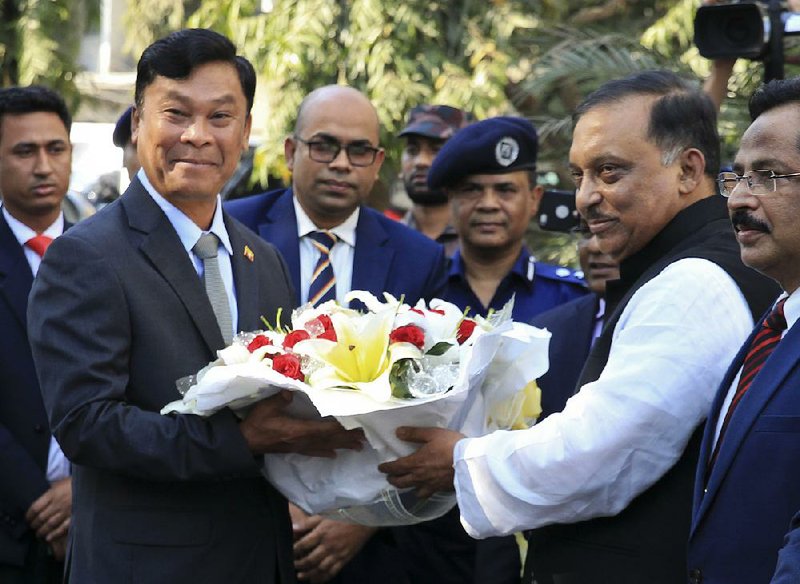Burma given list of refugees to repatriate
DHAKA, Bangladesh -- A Bangladesh Cabinet minister gave a list of 8,032 Rohingya refugees to his Burmese counterpart on Friday to begin repatriations of the Muslim minority under a November agreement between the two countries.
Bangladesh Home Minister Asaduzzaman Khan said the list contained the members of 1,673 Rohingya families. He did not explain how the names had been chosen.
About 700,000 Rohingya Muslims have fled army-led violence in Buddhist-majority Burma since last August and are living in refugee camps in Bangladesh. The two countries originally agreed to begin the repatriations last month, but they were delayed by concerns that the Rohingya would be forced to return and face unsafe conditions in Burma.
Khan said he presented the list to Burma Home Minister Lt. Gen. Kyaw Swe.
Khan said officials in Burma would choose 6,500 people Tuesday to be sent back in an initial phase.
Ethiopia declares state of emergency
ADDIS ABABA, Ethiopia -- Ethiopian officials have declared a state of emergency amid anti-government protests that have persisted for more than two years and in which hundreds have been killed and several thousand detained, the majority of whom have since been released.
"The current situation in the country has come to a point where it can't be handled with normal peace protecting mechanisms," said a statement issued by the Council of Ministers and read on the state broadcaster, the Ethiopian Broadcasting Corp., Friday evening. "It has been decided that a state of emergency is needed to protect the constitutional order of the country. The state of emergency is effective as of today."
The Council of Ministers' said the emergency is being declared because the protests have caused injuries and deaths, displacement of citizens, the destruction of properties, attacks based on ethnic lines and threats against the constitutional order of the country. It did not state how long the emergency will be in effect.
On Thursday Prime Minister Hailemariam Desalegn announced his surprise resignation saying he wanted to be part of a solution to the crisis.
Gunmen kill three teachers in Kenya
NAIROBI, Kenya -- Kenyan authorities said suspected al-Shabab extremists killed three teachers in an overnight attack Friday in the northeastern county of Wajir, while police said they foiled another attack in the east.
Gunmen attacked Qarsa primary school and targeted non-Muslim teachers, northeastern regional coordinator Mohamud Saleh said. A responding rescue team ran over an improvised explosive device but no one was injured, he said.
Education along Kenya's border with Somalia has been greatly hindered after many non-Muslim teachers refused to work in the region after the extremist group's targeting of non-Muslims starting in 2014 that left dozens dead.
The Somalia-based Al-Shabab has vowed retribution after Kenya sent troops in 2011 to fight the extremists in the Horn of Africa nation.
In the foiled attack in Merti in Isiolo county, police killed a suspected al-Shabab extremist and recovered a cache of weapons in his vehicle on Thursday, a police official said. At least 1,000 bullets, 36 grenades, 18 bombs and five rifles were recovered and two other suspects believed to be al-Shabab members were in custody, the official said.
Brazil puts army in charge of Rio security
Brazil's army is taking control of public security in the state of Rio de Janeiro as a wave of violence rattles the population and dominates media coverage ahead of this year's presidential election.
President Michel Temer issued a decree Friday putting an army general in charge of Rio's security forces, including the state's civilian police. The intervention, which requires congressional approval, will last until the end of the year, according to the decree.
"Our prisons will no longer be offices for thieves, our public squares party halls for organized crime," Temer said after signing the decree. "I know it's an extreme measure but many times Brazil requires extreme measures to put things in order."
The move, the first of its kind since Brazil returned to democracy in 1985, is a response to growing demands ahead of the October general elections for a crack down on crime.
A Section on 02/17/2018
